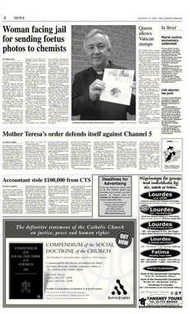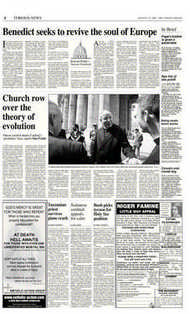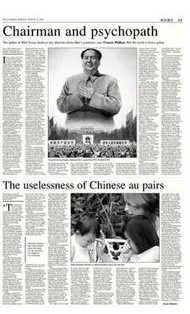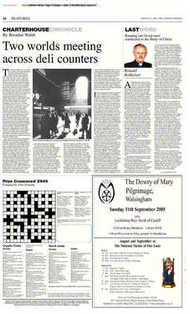Page 9, 12th August 2005
Page 9

Report an error
Noticed an error on this page?If you've noticed an error in this article please click here to report it.
Tags
Share
Related articles
'i Blame Beethoven For Tracey Emin...'
A Curious Journey To Orthodoxy
Cathedral Defends Decision To Stage Singing Of 99 Names...
The Trials Of A Court Composer
Church Comments On Beatle Lennon
Journalists’ Subjects Have Duties, Too
‘I fall in love with religions’
John Tavener talks to Ben Twiston Davies about gurus, muses and composing for Pope Benedict XVI He is friends with Prince Charles, met Igor Stravinsky and has hung out with the Beatles. He is possibly the foremost religious contemporary composer, yet he believes that religion is becoming increasingly “senile”.
Despite this, Sir John Tavener, 60, still writes for the Liturgy. His Missa Brevis for Westminster Cathedral was premiered this month, and he is writing an enlarged version for Pope Benedict’s forthcoming visit to Germany. His latest work is inspired by the Hindu deity Krishna, and he is looking forward to the premiere of The Beautiful Names, a work based on the 99 names of Allah, in Westminster Cathedral.
Tall, bronzed and clad in a white suit, Sir John cuts a striking figure; his blond hair is even longer than Beethoven’s.
How did you start composing?
When I was three I used to improvise on the piano, and I had a perceptive grandfather who used to act as an audience and applaud. I would improvise the sounds of the elements, of the rain, of lightning and such things.
You met two great musicians early in your career, Igor Stravinsky and John Lennon. What were they like?
Stravinsky had a sort of barbed, very French kind of wit; he didn’t speak that much English. I remember showing him a score, and he just wrote on it “I know”. I have no idea what he knew.
Was that Stravinsky’s only comment?
Well, he didn’t speak very much. I met him at the Royal Academy of Music and again at Oxford Town Hall, where he gave his last concert here. I remember being backstage, him taking my arm and saying, [putting on a Russian accent] “up to heaven, down to hell” as we went down the stairs – I think the hell was all the autograph seekers [outside].
John Lennon?
An American who lived in Here
ford Square rang me up one day and said: “I’ve got John Lennon and Yoko Ono coming to dinner, would you like to come, too?” We all sat on the floor, ate macrobiotic food and played each other’s tapes. John rang me the next day from his car telephone, saying he really wanted to record [Tavener’s breakthrough piece] The Whale.
How do you compose?
I hear sounds when I’m out walking, and then I just scribble them down. I cover endless pieces of paper until they reach a fairly large pile on my piano. Then I set them all out and look for the structural, melodic connections. If one’s in touch with the real imagi nation, with the real self, then there will be a logic to it. I try to piece those different ideas together and make a structure.
Is the voice important to your music?
I’ve got an atrocious voice. It’s been left slightly croaky and husky because of my stroke. But I can give an impression of what I want. It’s vital that I can sing it in some form. If I can’t sing it, I’ve no right to ask anybody else to.
Where else do you draw your inspiration?
Although my prayer life is explicitly Christian, I feel that all religions are a manifestation of God, and musically I feel an inner vocation to explore that.
You seem to have a very practical understanding of spirituality. I think if you don’t write out of experience there’s no point in writing at all. So much contemporary music is, to my ears, overcerebral and can only be understood by a very elite few. If it doesn’t come from the heart, basically, then I can’t quite see how it can communicate with anybody else.
Do you see yourself as belonging to a school of composition?
No, I think that Arvo Pärt [the Estonian composer] is someone I feel close to, not just because I know him personally but I feel close to his music, and to a certain extent Messiaen [the French composer], but it’s a very personal vision and Messiaen combines modernism with that personal vision. James MacMillan likewise; I think he combines modernism with that inner vision.
Why is your music so successful?
There is a huge sort of appetite for spirituality; it may not be in organised religion and one can, up to a point, understand why, because we have reached a point where it has begun to go senile. Thus the extreme example that is Islam.
What do you think needs to be done?
Well, a return to the heart, away from the mind. A sense of prayer within the heart.
Talk us through your religious journey.
It’s like a love affair. I fall in love with religions. The relationship to God is like a personal relationship, and He invites us to fall in love in various manifestations. When I see a sunset I usually cross myself because it’s not the sunset that’s wonderful, you think how wonderful God is.
There were three stages. There was the Presbyterian stage, and I can’t say that was all totally negative because I met some of the pastors of that time and one in particular impressed me tremendously. His humanism and his doubts impressed me.
Then there was the Catholic stage and the Spanish influence. Particularly mystics like St John of the Cross and St Teresa of Avila. Even the composer Vittoria. They were enormously important to me, and still are. If I go to the Maundy Thursday service I still weep.
There was the influence of Metropolitan Anthony [the late head of the Russian Orthodox Church in Britain and Ireland] and things Russian as well. I married a Greek when I was 30 and fell in love with Greece – the culture, the religion and everything connected. I also felt that Greece was a country that still had a sense of the primordial.
Much later on, when I was married again, I had a vision of Frithjof Schuon, the universalist philosopher. He started out a Protestant and at 30 was a Sufi. He always embraced all religions. It’s rather wild-sounding story, but it seems perfectly natural to me. It was after an American Indian holy man had come here [to his house in Dorset]... and brought me the gift of a pow-wow drum. He played the drum to me and said having it in the house will bring miraculous events. After he left I had a vision of Schuon who seemed to be saying to me that God was revealed in different ways and that I should somehow stick to Christianity in terms of personal life but I should express my interest in other religions.
So there have been a series of guru-like figures throughout my life. Perhaps less so now I’m in my 60s. I tend not to look for them anymore, not to be so interested in finding them.
Your interest in the Russian Orthodox faith coincided with your musical renaissance. Was Mother Thekla, a nun, librettist, and longtime collaborator, an important influence?
Yes, a very strong influence. I was drawn to a wildness in her character and a certain unorthodox, with a small “o”, personality; also her ability to create texts. She’s still alive [and] I’m going to see her next week. But we rather parted company when I became more universalist.
Women seem to have played an important role in your life both creatively and personally. You’ve been married several times, and collaborations with people such as Mother Thekla and Patricia Rosario, the soprano, have proved fruitful. Why?
The Sufis say that woman reveals God to man, hence the muse. I think the muse is very important and if one wants to realign oneself with traditionalist values then one has to take this into consideration. Human love, when understood correctly, is a mirror of divine love.
Would you like to write for the new Pope?
I just had the feeling that if I met him I’d love him... because he’s musical and one of the first things he did was to have a piano installed in the Vatican and that likens me greatly to him.
I am in fact writing for him. I was contacted about his coming visit to Germany and asked if I would like to write to a Mass. So I have made a substantially longer version of the Missa Brevis for a much larger choir.
blog comments powered by Disqus

















